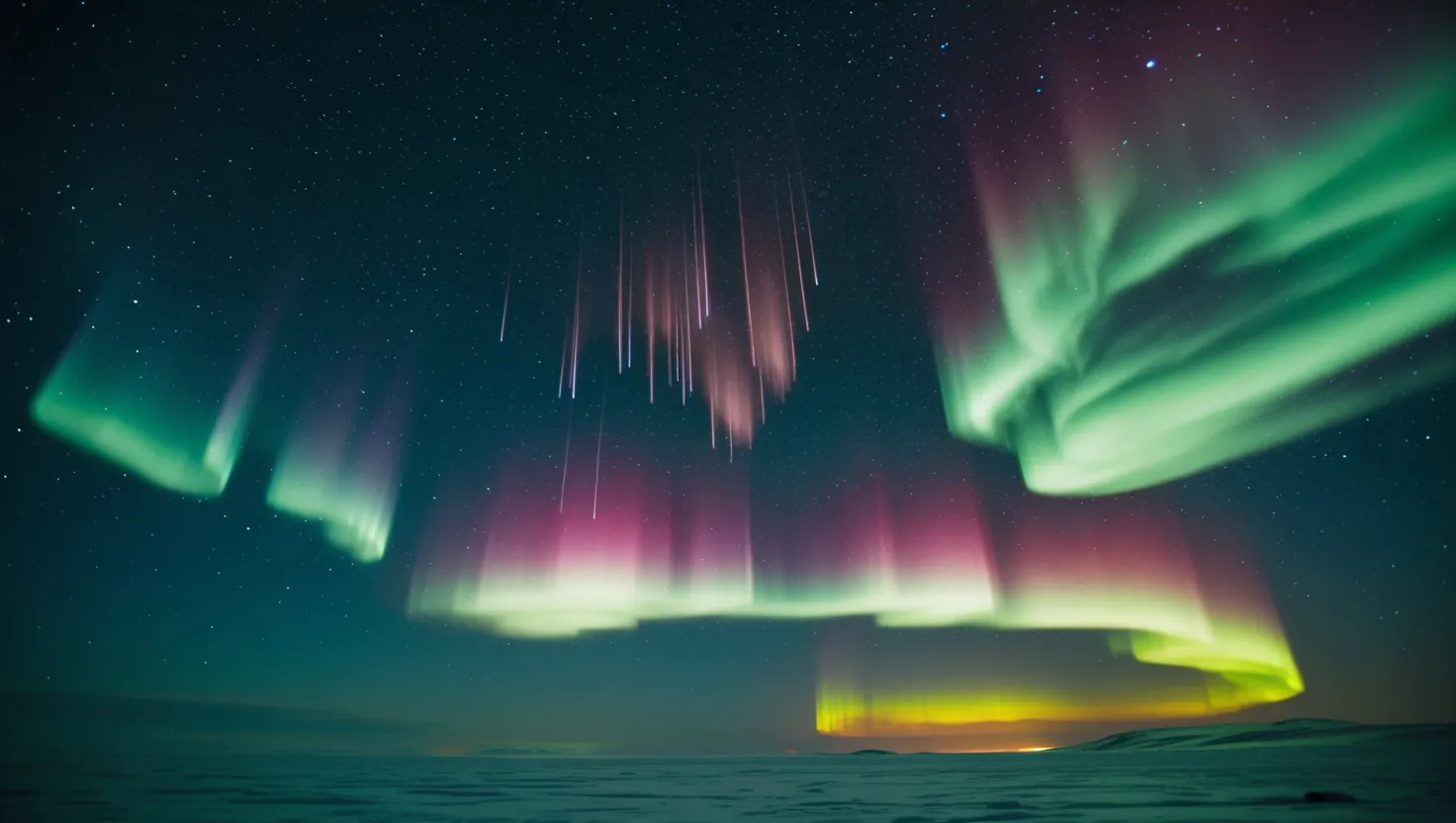As I gaze up at the sky, I often find myself pondering the mysteries that lie just beyond our everyday perception. The atmosphere, a realm we think we know well, is home to a multitude of phenomena that continue to baffle scientists and captivate the imagination of anyone who dares to look closer.
Sprites and Jets: The Electrical Spectacle
Above thunderstorms, a fleeting yet mesmerizing display of electrical discharges can be observed – sprites and jets. These are not your typical lightning bolts; they occur much higher in the atmosphere, often at altitudes of around 50 to 100 kilometers. Sprites appear as bright, reddish-orange flashes, while jets are more columnar and can reach even higher altitudes.
“As we learn more about the Earth’s atmosphere, we are reminded of how little we truly understand,” a sentiment that resonates deeply when considering these electrical marvels. The exact mechanisms behind sprites and jets are still under investigation, but scientists believe they are triggered by the massive electrical discharges within thunderstorms.
Imagine standing on a hill, watching a thunderstorm unfold in the distance. The rumble of thunder, the flash of lightning – and then, for a brief moment, a sprite or jet illuminates the upper atmosphere, a ghostly apparition that vanishes as quickly as it appears. What drives these events? The answer remains elusive, but the pursuit of understanding is what makes science so compelling.
Noctilucent Clouds: The Glowing Sentinels of the Mesosphere
Noctilucent clouds are another enigmatic presence in our atmosphere. These clouds form in the mesosphere, about 76 to 85 kilometers above the Earth’s surface, and are visible at night, glowing with an ethereal light. They are composed of ice crystals and are most commonly observed in polar regions during the summer months.
“Noctilucent clouds are a sign of a changing climate,” some scientists argue, as their appearance seems to be linked to the increasing levels of methane and water vapor in the atmosphere. However, the precise conditions under which they form and why they are becoming more frequent are still topics of intense research.
Have you ever seen a noctilucent cloud? It’s a sight that can leave you breathless – a cloud that shines like a beacon in the dark sky, a reminder of the intricate and often mysterious processes at play in our atmosphere.
Atmospheric Gravity Waves: Ripples in the Sky
Atmospheric gravity waves are ripples that propagate through the atmosphere, much like waves on a lake. These waves can be triggered by various factors, including wind shear, thunderstorms, and even volcanic eruptions. They play a crucial role in shaping our weather patterns and can influence the formation of clouds and precipitation.
“Gravity waves are the unsung heroes of atmospheric science,” a researcher once noted. While they are invisible to the naked eye, their effects can be profound. For instance, they can cause turbulence in aircraft and affect the distribution of atmospheric gases.
Imagine a stone thrown into a still pond, creating ripples that spread out in all directions. Atmospheric gravity waves work similarly, but on a much grander scale. They are a testament to the dynamic and interconnected nature of our atmosphere.
Polar Stratospheric Clouds: Colorful Formations in the Polar Regions
Polar stratospheric clouds (PSCs) are formations that appear in the stratosphere over polar regions during the winter months. These clouds are known for their vibrant colors and are composed of supercooled water droplets or nitric acid droplets. PSCs are significant because they play a role in the depletion of the ozone layer.
“Polar stratospheric clouds are like the canaries in the coal mine,” indicating the health of our stratosphere. The formation of these clouds is closely tied to the temperature and chemical composition of the stratosphere. However, predicting their exact behavior remains a challenge due to the complex interplay of factors involved.
If you’ve ever seen pictures of PSCs, you might have been struck by their beauty – clouds that shimmer with hues of pink, blue, and green. But beneath their aesthetic appeal lies a complex scientific puzzle that scientists are still working to solve.
Ball Lightning: The Unexplained Luminous Spheres
Ball lightning is one of the most bizarre and least understood atmospheric phenomena. It appears as glowing, floating spheres of light, often during thunderstorms. Despite numerous reports, the nature of ball lightning remains a mystery.
“Ball lightning is a phenomenon that has fascinated people for centuries,” yet it continues to defy explanation. Scientists have proposed various theories, including electrical discharges and chemiluminescence, but none have been proven conclusively.
Imagine witnessing a glowing orb floating through the air, its origin and fate unknown. It’s a sight that sparks both wonder and curiosity, a reminder that there are still many secrets hidden in the skies above us.
Morning Glory Clouds: Rare Rolling Cloud Formations
Morning glory clouds are rare, tubular clouds that can appear in the fall, typically in the Great Plains of the United States or in Australia. These clouds are associated with severe thunderstorms and can create rolling waves in the sky that can be surfed by glider pilots.
“Morning glory clouds are a rare treat for cloud enthusiasts,” offering a glimpse into the dynamic and unpredictable nature of atmospheric phenomena. The conditions necessary for their formation are quite specific, involving a combination of cool air near the surface and warm air above, which creates a rolling wave-like structure.
Have you ever seen a morning glory cloud? It’s a sight that can leave you in awe – a rolling wave of cloud that stretches across the sky, a testament to the incredible diversity and complexity of our atmosphere.
The Ongoing Quest for Understanding
As we delve into these mysterious atmospheric phenomena, we are reminded of the vast and unexplored territories of our planet’s weather systems. Each of these phenomena presents a unique challenge and opportunity for scientific discovery.
“The universe is not only stranger than we think, it is stranger than we can think,” as Albert Einstein once said. This quote resonates deeply when considering the mysteries of our atmosphere. The pursuit of understanding these phenomena is not just about solving scientific puzzles; it’s about appreciating the intricate beauty and complexity of our planet.
So the next time you look up at the sky, remember that there is more to it than meets the eye. There are sprites and jets flashing above thunderstorms, noctilucent clouds glowing in the mesosphere, gravity waves rippling through the atmosphere, polar stratospheric clouds forming in the stratosphere, ball lightning floating mysteriously, and morning glory clouds rolling across the horizon.
Each of these phenomena is a reminder of the awe-inspiring complexity of our atmosphere and the ongoing quest for scientific understanding that drives us to explore and explain the world around us.






